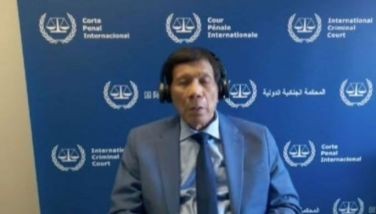Yasay clarifies stand on ‘sharing’
MANILA, Philippines - After the release by an arbitral court of its ruling on Manila’s maritime case against Beijing on Tuesday, the Philippine government will first “study and dissect its implications” before making its next move like entering into arrangements with China for joint exploration of disputed areas in the South China Sea, Foreign Affairs Secretary Perfecto Yasay Jr. said yesterday.
He was clarifying his statement in an AFP interview that the Philippines is open to sharing resources in the West Philippine Sea with China, whether it wins or loses its case in the arbitral tribunal in The Hague.
“What I said is we have to wait for the ruling and study and dissect its implications,” Yasay said.
“As the ruling will not address sovereignty and delimitation, it is possible that some time in the future, claimant countries might consider entering into arrangements such as joint exploration and utilization of resources in disputed areas that do not prejudice the parties’ claims and delimitation of boundaries in accordance with UNCLOS (UN Convention on the Law of the Sea),” he pointed out.
The AFP story, carried by most local dailies, quoted Yasay as saying the Philippines was ready to begin direct talks with Beijing immediately after the release of the tribunal’s verdict, with the talks even covering jointly exploiting natural gas reserves and fishing grounds within the Philippines’ exclusive economic zone.
Reacting to Yasay’s AFP interview, Sen. Leila de Lima advised the Duterte administration to study very carefully its plan to enter into joint exploration with China in the West Philippine Sea.
De Lima said that such arrangement could have serious implications, especially if the Philippines wins in its case in the international arbitral tribunal.
“I hope the current administration will study this carefully. They should reflect on it very thoroughly and very seriously,” De Lima said over dwIZ radio.
“What would be the relation of this with the case, especially if we get a favorable ruling?” she added.
De Lima said the Philippines was able to gain the respect of the international community when it filed the case against China as it showed the country’s determination to stand by its principles and observe the rule of law.
While it is possible that the executive branch can undertake the joint exploration on its own, De Lima said it would still be more prudent for the administration to conduct widespread consultation on an issue of such importance.
“It would be better if it could get the opinions of various sectors, especially the legal and diplomatic sectors,” she said.
Meanwhile, a Manila-based think tank said a decision by the arbitral court favorable to the Philippines Days would strengthen a non-military scenario and pave the way for further diplomacy.
“If we get the verdict we expect, it is imperative to cull the best thinking on different post-arbitration scenarios and initiate dialogue on strategically approaching geopolitical, economic and social changes in the region.” said Dindo Manhit, president of the Stratbase Albert del Rosario Institute. (ADRi).
He said the country must capitalize on the international interest in the case to garner international support for its position and elicit strong statements from other countries.
While pursuing this initiative, Manhit said the Philippines needs to take steps to protect itself from any possible adverse Chinese reaction after ther release of the verdict.
“On a medium term, we need to make peace and foster a new era of engagement with China based on mutual respect and the rule of international law,” Manhit said.
Stratbase ADRi trustee and International Criminal Court justice Raul Pangalangan said filing the case was a game changer for the Philippines, which would have been at a disadvantage in a bilateral setup.
“In a David versus Goliath scenario, the Philippines would have been helpless; by filing the case, we have shifted it from a two-party settlement and submitted it to a third-party decision-maker in the tribunal,” he said.
Subjecting the case to arbitration also undermined the military aspect of the dispute and instead highlighted the primacy of international law, Pangalangan said.
“It will provide our neighbors in Asia and our allies abroad a neutral ground upon which to take a position on the issue. In other words, without states saying ‘China is right’ or ‘Philippines is right,’ we provide even the erstwhile hesitant ASEAN states an opportunity to take a decision without riling China’s sensitivities,” Pangalanan, said.
But getting other, more capable countries involved in the case is something that China doesn’t like, said Renato de Castro, also an ADRi trustee.
“The Philippines has sought closer security arrangements with the US and Japan, which have shown interest in providing security and diplomatic support to the Philippines.”
Deeper US and Japan involvement might further complicate the dispute, as this would make China more belligerent and more uncompromising in dealing with the Philippines, especially after the case was filed.
ADRi will host a forum with the UP Institute for Maritime Affairs and Law of the Sea on the subject on July 15, 9 a.m. at the Malcolm Theater of the UP College of Law in Diliman. – With Marvin Sy, Jaime Laude
- Latest
- Trending

























